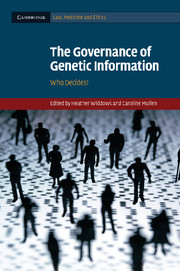Book contents
- Frontmatter
- Contents
- Notes on contributors
- Preface
- Introduction
- SECTION I Problematising governance of genetic information
- SECTION II Ethical frameworks of governance
- SECTION III Redesigning governance
- 7 Involving publics in biobank governance: moving beyond existing approaches
- 8 Genetic information and public opinion
- 9 Harmonisation and standardisation in ethics and governance: conceptual and practical challenges
- Bibliography
- Index
8 - Genetic information and public opinion
Published online by Cambridge University Press: 02 February 2010
- Frontmatter
- Contents
- Notes on contributors
- Preface
- Introduction
- SECTION I Problematising governance of genetic information
- SECTION II Ethical frameworks of governance
- SECTION III Redesigning governance
- 7 Involving publics in biobank governance: moving beyond existing approaches
- 8 Genetic information and public opinion
- 9 Harmonisation and standardisation in ethics and governance: conceptual and practical challenges
- Bibliography
- Index
Summary
The purpose of this chapter is to explore the nature of public debate in the field of genetics. Focusing on the issue of developing DNA biobanks, it will be argued that public consultation and involvement are crucial to the process of sustaining and legitimating such projects. However, it will be suggested that consultation processes are readily distorted, due to the complexity of the science involved, and the ideological distortions that are inherent in much of the language and imagery that is available to think about genetics. It will therefore be suggested that public consultation must proceed in the spirit of an ideology critique – that takes both the scientific and public understandings of genetics seriously, but recognises that such understandings may be symptomatic of deep-seated cultural fears and imbalances of power.
Genetic information and biobanks
Einsiedel argues that the completion of the mapping and sequencing of the human genome in 2001 was not the end of a project, but the beginning. The human genome is not, in itself, meaningful. Mapping and sequencing merely serve to identify the chromosomal site of each gene, and to identify the gene's molecular composition (of deoxyribonucleic acid (DNA) base pairs), respectively. Genes are expressed in the production of proteins. Understanding and making sense of the role that this fundamental organic chemistry plays in the formation and behaviour of any organism, let alone the complex cultural being that is the modern human, is daunting, both as a project within the natural sciences, and as one within the social sciences and humanities.
- Type
- Chapter
- Information
- The Governance of Genetic InformationWho Decides?, pp. 178 - 200Publisher: Cambridge University PressPrint publication year: 2009

